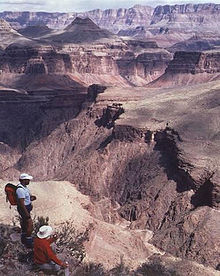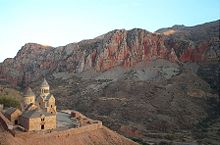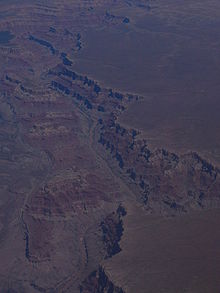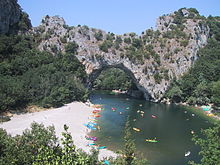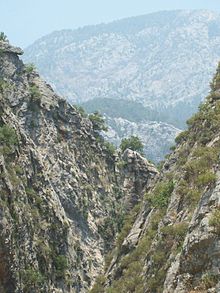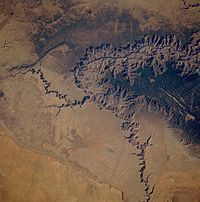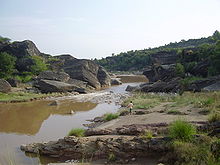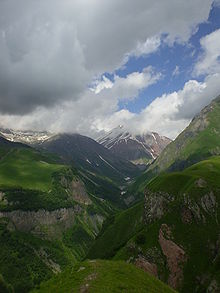- Canyon
-
For other uses, see Canyon (disambiguation)."Gorge" redirects here. For the figure from Greek mythology, see Gorge (mythology). For the old English meaning, see throat.
A canyon (occasionally spelled cañon) or gorge is a deep ravine between cliffs often carved from the landscape by a river. Rivers have a natural tendency to reach a baseline elevation, which is the same elevation as the body of water it will eventually drain into. This forms a canyon.[1] Most canyons were formed by a process of long-time erosion from a plateau level. The cliffs form because harder rock strata that are resistant to erosion and weathering remain exposed on the valley walls. Canyons are much more common in arid areas than in wet areas because physical weathering has a greater effect in arid zones. The wind and water from the river combine to erode and cut away less resistant materials such as shales. The freezing and expansion of water also serves to help form canyons. Water seeps into cracks between the rocks and freezes, pushing the rocks apart and eventually causing large chunks to break off the canyon walls which are also known as frost wedging.[2] Canyon walls are often formed of resistant sandstones or granite. Submarine canyons form underwater, generally at the mouths of rivers. The word canyon is Spanish in origin (cañón, pronounced: [kaˈɲon]). The word canyon is generally used in the United States, while the word gorge is more common in Europe and Oceania, though it is also used in some parts of the United States and Canada. The military derived word defile is occasionally used in the United Kingdom.
A famous example is the Grand Canyon in Arizona with an average depth of one mile and a volume of 4.17 trillion cubic metres.[3] In the southwestern United States, canyons are important archeologically because of the many cliff-dwellings built there, largely by the earlier inhabitants, Ancient Pueblo Peoples.
The Yarlung Zangbo Grand Canyon (or Tsangpo Canyon), along the Yarlung Tsangpo River in Tibet, China, is regarded by some as the deepest canyon in the world at 18,000 feet, and is slightly longer than Grand Canyon making it one of the world's largest.[4] The Kali Gandaki Gorge in midwest Nepal is seen by others to be the deepest canyon, with a 21,000 foot difference between the level of the river and the peaks surrounding it.
Sometimes large rivers run through canyons as the result of gradual geological uplift. These are called entrenched rivers, because they are unable to easily alter their course. The Colorado River in the Southwest and the Snake River in the Northwest are two examples of tectonic uplift.
Canyons often form in areas of limestone rock. Limestone is to a certain extent soluble, so cave systems form in the rock. When these collapse a canyon is left, for example in the Mendip Hills in Somerset and Yorkshire Dales in Yorkshire, England.
A canyon may also refer to a rift between two mountain peaks such as those in ranges such as the Rocky Mountains, the Alps, the Himalayas or the Andes. Usually a river or stream and erosion carve out such splits between mountains. Examples of mountain type canyons are Provo Canyon in Utah or Yosemite National Park in California's Sierra Nevada. Canyons within mountains or gorges that only have an opening on one side are called box canyons. Slot canyons are very narrow canyons, often with smooth walls.
Contents
Largest canyons
- Tsangpo Canyon in Tibet, China
- Grand Canyon in Arizona, United States
- Copper Canyon in Chihuahua, Mexico
The definition of "largest canyon" is rather imprecise, as a canyon can be large by its depth, length, or the total area of the canyon system. Also the inaccessibility of the major canyons in the Himalaya contributes to their not being regarded as candidates for the biggest canyon. The definition of "deepest canyon" is similarly imprecise, especially if one includes mountain canyons as well as canyons cut through relatively flat plateaus (which have a somewhat well-defined rim elevation).
Lists
List of canyons
- Black Canyon of the Gunnison, Colorado, USA
- Blyde River Canyon, Mpumalanga, South Africa
- Canyon de Chelly, Arizona, USA
- Canyon Sainte-Anne, Quebec, Canada
- Charyn Canyon, Kazakhstan
- Harmanköy Canyon, Bilecik Turkey
- Chicamocha Canyon, Santander, Colombia
- Colca Canyon, Arequipa, Peru
- Copper Canyon, Chihuahua, Mexico
- Cotahuasi Canyon, Arequipa, Peru
- Fish River Canyon, Namibia
- Fraser Canyon, British Columbia, Canada
- Grand Canyon of Torotoro, Torotoro, Potosi Department, Bolivia
- Grand Canyon of the Yellowstone, Wyoming, USA
- Guartelá Canyon, Paraná, Brazil
- Hells Canyon, Idaho and Oregon, USA
- Horseshoe Canyon, Alberta, Canada
- Huasteca Canyon, Monterrey, Mexico
- Kanionet e Skraparit, Albania
- Kings Canyon (Northern Territory), Australia
- Little River Canyon, Alabama, USA
- Logan Canyon, Utah, USA
- Matka Canyon, Republic of Macedonia
- Nfeye Canyon, Portugal
- Nine Mile Canyon, Utah, USA
- Ouimet Canyon, Ontario, Canada
- Palo Duro Canyon, Texas, USA
- Rugova Canyon, Kosovo, Europe
- Saturban canyon, Santander, Colombia
- Somoto Canyon, Somoto, Madriz, Nicaragua
- Shnizow Canyon, Uşak, Turkey
- St. Christopher's Canyon (Cañon de San Cristobal), Barranquitas/Aibonito, Puerto Rico
- Sumidero Canyon, Chiapas, Mexico
- Tara River Canyon, Montenegro, Europe
- Valla Canyon, Kure,Turkey
- Waimea Canyon, Hawaii, USA
- Yarlung Zangbo Grand Canyon, Tibet Autonomous Region, China
- Tara River Canyon, Montenegro, Europe
List of gorges
- Aragvi River Gorge, Georgia (country)
- Avon Gorge, Bristol, England
- Bog Walk Gorge, Saint Catherine Parish, Jamaica
- Bued Gorge, Benguet, Philippines
- Buller Gorge, Buller, New Zealand
- Cataract Gorge, Launceston, Australia
- Cheddar Gorge, Somerset, England
- Chovar Gorge, Kathmandu, Nepal
- Columbia River Gorge, Oregon/Washington USA
- Corrieshalloch Gorge, Ullapool, Scotland
- Galston Gorge, NSW, Australia
- Gorropu, Sardinia, Italy
- Ironbridge Gorge, Shropshire, England
- Kali Gandaki Gorge, Gandaki, Nepal
- Kloof, KwaZulu-Natal, South Africa (The word Kloof means 'gorge' in Afrikaans)
- Komati Gorge, South Africa
- Lanner Gorge, South Africa
- Letchworth State Park (Genesee River Gorge), New York, USA
- Linville Gorge Wilderness, North Carolina, USA
- Manawatu Gorge, Manawatu, North Island, New Zealand
- Montalban Gorge, Philippines
- New River Gorge, West Virginia, USA
- Niagara Gorge, Canada/USA
- North and South Gorges of North Stradbroke Island, QLD, Australia
- Katherine Gorge of Nitmiluk National Park in Australia
- Pankisi Gorge, Georgia (country)
- Pine Creek Gorge, Pennsylvania, USA
- Quechee Gorge, Vermont, USA
- Red River Gorge, Kentucky, USA
- Richtis Gorge, Crete, Greece
- Rio Grande Gorge, New Mexico, USA
- Royal Gorge, Colorado, USA
- Samaria Gorge, Crete, Greece
- Siq, Petra, Jordan
- Talari Gorges, Mali
- Tallulah Gorge, Georgia, USA
- Gorges du Tarn, France
- Taroko Gorge of Taroko National Park, Taiwan
- Three Gorges, Chongqing, China
- Tiger Leaping Gorge, Yunnan, China
- Verdon Gorge, Provence, France
- Viamala, Graubünden, Switzerland
- Vikos Gorge, Vikos–Aoös National Park, Greece
List of other features causing gorges or canyons
- Ardèche River, France
- Bued River, Philippines
- Danube River, Europe, including the Iron Gate
- Ruinaulta, cutting Flims Rockslide, Switzerland
- Kings River of the Kings Canyon National Park, California, USA
- South Nahanni River in Canada [1]
- Steall Waterfall of Glen Nevis, Lochaber, Scotland
- Gorges de Hérault, France
- Sierra y Cañones de Guara, Alquezar, Spain.
Canyons on other planetary bodies
- Valles Marineris on Mars, the largest known canyon in the solar system
- Ithaca Chasma on Saturn's moon Tethys
Venus has many craters and canyons on its surface. The troughs on the planet are part of a system of canyons that is more than 6 400 km long.
See also
- Antecedent drainage stream
- Canyoning
- Dalles
- Draw (terrain)
- Geomorphology
- Gully
- List of landforms
- Ravine
Notes
External links
 Media related to Canyon at Wikimedia Commons
Media related to Canyon at Wikimedia CommonsRiver morphology Large-scale features Alluvial rivers Meander • Meander cutoff • Point bar • Cut bank • Riffle • Stream pool • Braided river • Bar (river morphology) • Anabranch • River bifurcation • River channel migration • Oxbow lake • Floodplain • Riparian corridor • Avulsion (river) • Mouth bar • Thalweg • Channel patternBedrock river Bedforms Regional processes Mechanics Playfair's Law • Hack's law • Sediment transport • Water erosion • Deposition (geology) • Exner equationCategories:- Canyons and gorges
- Erosion landforms
- Fluvial landforms
Wikimedia Foundation. 2010.

